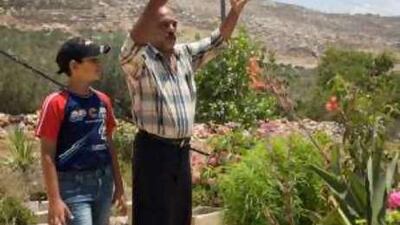BURIN, WEST BANK // Rockets? Smoke grenades? Fireworks? On July 1, two objects were fired from somewhere on to Jamal Najar's land in the village of Burin, near Nablus, in the occupied West Bank. Residents and civil emergency staff insist that they were rockets fired from a nearby Israeli settlement. But Israeli police said they were fireworks, or perhaps "some kind of flare". An Israeli human rights organisation said it believed they were smoke grenades.
What is certain is that this was the second report of rocket fire in the area in one month, and the Palestinian residents of Burin fear an escalation of their already tense and sometimes violent relations with settlers in the area. "It was around 1.30 in the afternoon," said Mr Najar, 48, a retired policeman. "I was sitting on my balcony when I saw this thing spiralling out of the air. There was a trail of fire and it landed somewhere up the hill."
When the second object came down, this time closer to his house, Mr Najar was convinced settlers were firing rockets at his land, prompting him to call the fire department. Mr Najar had some cause to suspect Israeli settlers. On June 20, he and other villagers had read Israeli media reports that a resident of the nearby Yitzhar settlement had fired a homemade rocket, not too dissimilar from the crude Qassam rockets favoured by Palestinian militants in the Gaza Strip, at an open field in Burin.
Mr Najar's home lies near the top of a typical, rocky West Bank hill and at the edge of Burin village, which traces its history to Roman times. An empty stretch of semicultivated land separates Mr Najar, his wife and six children from their closest neighbours: the Israelis at Brakha settlement. The Yitzhar and Brakha areas traditionally attract ultranationalist settlers and the locals have had plenty of run-ins with them over the years. "Usually we can see settlers moving about up there," Mr Najar said. "This time I saw only two people. A few minutes after the second rocket fell, a jeep drove across to them, and then drove away. With it, the two people also vanished."
Wahib Qadous, 33, a fireman, was on duty on July 1 when he and his colleagues responded to a call that rockets had been fired at Burin. They found two metallic cylinders near Mr Najar's home that had made little impression in the rocky ground. Mr Qadous filmed one of the cylinders on his mobile phone. "They looked like the heads of homemade rockets," he said. But the Burin civil emergency department did not have the chance to investigate the tubes. As per the Oslo agreement, they contacted the local Palestinian District Co-ordination Office, which in turn contacted the Israeli DCO. Under the Oslo accord, Burin is administered by Palestinians, but the Israel army is in charge of security.
Within a short while, Mr Qadous said, Israeli soldiers turned up to gather the evidence for the Israeli police to investigate. That investigation has concluded, according to Danny Poleg, an Israeli police spokesman, that the objects in question were not rockets, but "some kind of flair or fireworks". Dan Magen, of the Yesh Din organisation, an Israeli human rights group that specialises in investigating settler violence in the West Bank, said he agreed the object was not a rocket, and said footage obtained by his organisation suggested it was actually a smoke grenade.
But that only confuses the issue further. A smoke grenade looks like a hand grenade and Mr Qadous's footage shows a cylindrical object about 12 inches long, a shape more readily associated with a crude rocket. That suspicion is strengthened by an earlier incident in which a student in the Yitzhar settlement was reported to have fired a rocket on June 14 that caused a small blaze in a grassy field. No arrests were made, according to Mr Poleg, who also dismissed claims it was a rocket that caused the fire. That the Israeli police, responsible for enforcing law among settlers in the West Bank, found no cause to indict or investigate further in either incident should perhaps come as no surprise. There have been two recent incidents, the latest yesterday, where settlers were arrested, in both cases for beating Palestinians and both instances in which there was clear videotaped evidence.
But according to research from Yesh Din, in more than 90 per cent of cases where the police opened an investigation into alleged settler violence, no indictments were filed. Furthermore, violent incidents involving settlers and locals in the Nablus area are common and escalating according to locals. The Burin civil emergency department responded to 36 incidents in June, 22 of which were settler related, said Shukri al Zaben, Burin's deputy fire chief. These include fires set in fields, trees cut down and harassment of local shepherds and farmers.
"There's a long record of tensions between the small settlements surrounding Nablus and local Palestinians," said Gershon Gorenberg, an Israeli journalist who wrote a book on the settlement movement, The Accidental Empire. Mr Gorenberg would not comment on the likelihood that settlers in the area had started to develop rockets, but said the area was known "even in settler circles for attracting people that are very hardline ideologically.
"If this report [of rocket fire] is true," Mr Gorenberg said, "the irony is that extremists on each side can learn from each other." @Email:okarmi@thenational.ae

